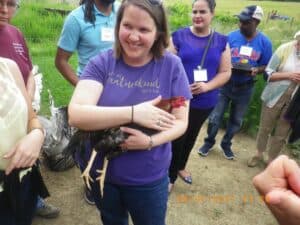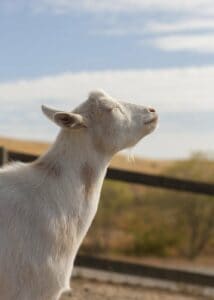
CreatureKind spent the latter part of December and the first week of January on the road, first exhibiting and talking to attendees of InterVarsity’s Urbana Missions Conference and then the Society of Christian Ethics annual meeting (held in conjunction with the Society of Jewish Ethics and the Society for the Study of Muslim Ethics).
For me, these two very different events highlighted both the success and deep need for the work of CreatureKind.
At Urbana, we spoke with hundreds of college students, the vast majority of whom had never thought about the connection between faith and animals. Throughout the event, it was clear that there is a profound need for CreatureKind’s work to encourage Christians to recognize faith-based reasons for caring about the well-being of fellow animal creatures used for food, and to take practical action in response.
At Urbana, we spoke with hundreds of college students, the vast majority of whom had never thought about the connection between faith and animals.
A small number of students were thrilled to see us. One vegetarian said, “I thought I was the only one!” Another student gestured toward our table and said, “I’ve never seen this as a Christian thing! But it’s something that I’m interested in.”
Other students, many of whom were studying animal science or agriculture or who hunted for food, approached our display with a bit of suspicion, thinking we might be there to condemn farmers or insist that every Christian must be vegan. These were extraordinary opportunities to demonstrate that CreatureKind’s primary goals are to raise awareness, build bridges, and help Christians make food choices that reflect their values.
From Urbana, we headed straight to Louisville, Kentucky for the annual meeting of the Society of Christian Ethics (SCE). Four years ago, CreatureKind held our official launch at SCE. We’re now in conversation with nearly 50 schools and organizations, encouraging these institutions to adopt more animal-friendly food policies driven by Christian values. I am able to work full-time on CreatureKind, and we have a growing team of partners, many of whom are a part of an increasing number of religious educators who include animal ethics in their teaching and preaching. Most of the professors we spoke with at SCE recognized the urgency and importance of helping their students think about factory farming and animal welfare, and the connections between these issues and climate change, food security, immigration, worker justice, environmental racism, and more.
In addition to our table at SCE, where professors could talk with us about our institutional food policy program, CreatureKind held our annual reception (we hosted around 30 people this year, our biggest event to date). David Clough gave a paper called, “Eating More Peaceable: Christianity and Veganism.” And we attended a panel on “Christians and Other Animals: Book Symposium on David Clough’s On Animals, Vol II: Theological Ethics (2018), during which Maria Teresa Davila, Eric Gregory, Jennifer Herdt, and Darryl Trimiew offered their responses to David’s new volume.
If you are sad that you couldn’t be there in person for this incredible panel discussion, have no fear! The Syndicate Network will be releasing the papers, David’s response, and an introduction by CreatureKind North American Advisory Council member Candace Laughinghouse. Sign up here to stay in the loop. And be sure to check out David’s upcoming North American book tour dates.
So on the one hand, we are in touch with an extraordinarily engaged community of scholars and practitioners who are deeply committed to helping the church re-engage with our call to care for the whole of God’s creation. On the other hand, there is still much work to be done to help Christians make connections between God’s other creatures and our faith. If you want to help us in this important mission, please don’t hesitate to reach out, donate, or share our work with others.
 Sarah Withrow King is the co-director of CreatureKind and the author of two books: Animals Are Not Ours (No Really, They’re Not): An Evangelical Animal Liberation Theology(Wipf & Stock) and Vegangelical: How Caring for Animals Can Shape Your Faith (Zondervan). This post originally appeared on CreatureKind.
Sarah Withrow King is the co-director of CreatureKind and the author of two books: Animals Are Not Ours (No Really, They’re Not): An Evangelical Animal Liberation Theology(Wipf & Stock) and Vegangelical: How Caring for Animals Can Shape Your Faith (Zondervan). This post originally appeared on CreatureKind.


